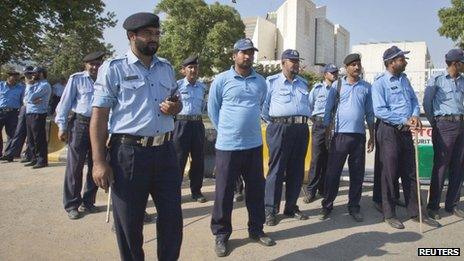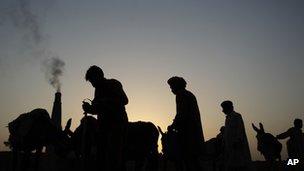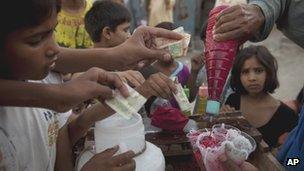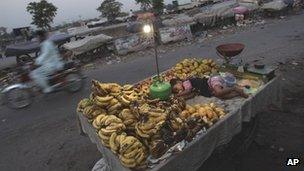Clash of Pakistan's governing titans
- Published

Pakistan's Supreme Court has been accused of acting like a military dictator
Pakistan's government, the courts, the opposition parties and even the media have spent weeks hurling accusations at one another. As the country teeters on the brink of meltdown, writer Ahmed Rashid says early elections may be the only way out of the latest quagmire.
Just days after former Prime Minister Yousuf Raza Gilani was forced to step down by Pakistan's increasingly interventionist Supreme Court, two new notices were issued by the Supreme Court and the Lahore High Court against the president and the new prime minister.
The case against President Zardari - which must be resolved by 5 September - revolves around whether or not it is lawful for him to be president as well as chairman of the governing Pakistan People's Party (PPP) - because under the 1973 constitution he cannot hold both posts simultaneously.
Another case, dubbed "memogate", revolves around the treason investigation into Pakistan's former ambassador to the US, Hussain Haqqani, who is accused of trying to secure Washington's help last year to help avert a possible coup after the death of Osama Bin Laden.
It has now been lodged as a formal case in the Supreme Court. Lawyers will try and prove that Mr Haqqani was not acting alone but on behalf of the president - so both would then be guilty of treason.

Economic and political meltdown may be avoided by early elections
If either case goes against him, he could be forced to step down immediately or be forced to confront the courts in a protracted legal battle. Both outcomes would deepen Pakistan's political crisis.
Meanwhile, the Lahore High Court has made the same demand from Prime Minister Ashraf that it made from former Prime Minister Gilani - that he must write to the Swiss authorities to reopen old corruption cases against President Zardari. Mr Gilani chose to step down rather than accuse his party leader of corruption.
'Overbearing court'
At the same time there is increasing anger among lawyers, jurists, politicians and civil society representatives that the Supreme Court is acting like a military dictator.
It has been accused of interfering in constitutional issues which are better left to parliament and sacking elected leaders for which it has no mandate.
Far from easing Pakistan woes, it is argued that the country's overbearing higher court has worsened them.
A symptom of this stand-off is the paralysis shown by the beleaguered government in dealing with severe social and economic issues.
These include a burgeoning electricity crisis that has left small towns without power for up to 18 hours a day, a massive debt crisis and the continued breakdown of relations with the US.

Religious minorities complain of being frequently targeted by militants
This has dragged on for seven months and has meant that the road from Karachi that supplies Nato forces in Afghanistan has not been functioning.
Economic collapse and relentless extremist violence have taken a huge toll on life and property.
Minorities belonging to non-Muslim sects and even large numbers of Muslims belonging to smaller sects, such as the Shias, are being gunned down on a daily basis.
Pakistan stands deeply isolated and intensely criticised among the community of nations.
The second casualty could well be the democratic system as a whole.
People ask why the courts cannot show patience when the government has to hold general elections within the next nine months.
The opposition would like to see them held immediately, but it is co-operating with the government in appointing a consensus candidate as Chief Election Commissioner (CEC).
Once parliament is dissolved the CEC would appoint an interim government of neutral personalities for three months to oversee the vote.
Nobody can say which of the three main parties would win an election. Success for the PPP is unlikely given its dismal performance in governance and handling the economy - but it is still likely to win many seats in parliament.
What is certain is that there would be no decisive winner and Pakistan would have to undergo another coalition government.
Loggerheads
PPP officials are suspicious that not only is the Supreme Court intensifying its long running vendetta against President Zardari, but that the courts are playing into the hands of the army which may like to see an interim government extended by one or two years so that it can clean out corrupt politicians.

The centres of power must realise how fragile and vulnerable the country is right now
There is however no direct indication of what exactly the all-powerful army desires. But it is clear that it has no interest in carrying out a coup.
All Pakistan's major institutions of state are now at loggerheads and stand discredited except the army.
The courts, the government, the opposition parties and the media have spent the last weeks hurling accusations against one another and accusing each other of corruption.
To avoid another tussle with the courts, many of President Zardari's advisers are telling him to announce early general elections, which could be held this winter.
At the same time there is rising criticism of the courts - they are accused of not allowing an elected government to finish its term in office and of interfering in the democratic transition which Pakistan so badly needs.
No elected government in the past has ever fulfilled a full term and been replaced by another elected government - military coups have intervened five times.
The public meanwhile is fed up with a government that appears horribly distracted and cannot deal with the day-to-day crises that people are facing.
So far the president has avoided an out-and-out standoff with the judiciary by letting Mr Gilani resign.
But Mr Zardari cannot allow the new prime minister also to step down while exposing himself to the court's demands.
Far better that the president trump the courts by going for early elections, taking the stance of an aggrieved victim of the judiciary's machinations.
Pakistan's economic and political meltdown may just be avoided by early elections, a new government and an improved relationship between all centres of power in the country.
Working that out is not impossible - but it can only occur if all the centres of power realise how fragile and vulnerable the country is right now.
- Published6 June 2012
- Published3 June 2012
- Published18 January 2012
- Published27 December 2011
- Published25 June 2010